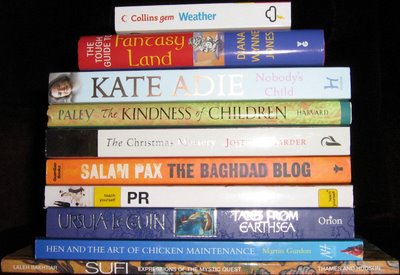The Importance of Habits
Today it struck me that a lot of people get labelled as having 'good memories', or as being 'forgetful' when actually better labels for them might be 'well habituated' and 'badly habituated'.
I suspect a case of missing the symptoms for the diagnosis.
What are the symptoms?
- A failure to act in an expected way.
- Forgetfulness
- Inadequate habituation
He's an extreme example, in a story. No memory, so he relies on a paper memory (slow!) and some really regimented, strict, habits, which obviously are difficult to train (if you have no memory, how do you keep concentrating on ingraining habits?), but once trained are very handy.
The rest of us are less extreme, but I think the idea still applies.
We do far more things in a day than we could possibly remember to do. I would say that the majority of things we do are habitual, or automatic. Heartbeats are the extreme end of automatic. Breathing is automatic, but we can control it if we choose. Remembering to eat is, for most of us a bit of automatic, a bit of habit and often a lot of headscratching as to what to eat. Keeping appointments can be memory, or if they're regular appointments, then that's liable to be a habit. Watching the news over breakfast, or listening to radio shows, is habitual for many people. You could even argue that driving, typing, riding a bike, are types of habit (after all, if I had to remember to declutch to change gears every time I want to change gears, and remember ever action of that level of detail, then life would surely overwhelm me fast!).
So, if I find myself unable to keep my life under control, is it that I have a bad memory? If most of my actions are significantly based in habit, then I would say no. I would say that I might have a bad memory, but that more importantly I have failed to ingrain useful habits in myself.
But if most of my actions are habitual, and I have failed to ingrain useful habits, what habits do I have? Unuseful ones? That's worrying. How did they get there? Either I put them there (self-destructive? definitely hints at internal contradiction that I might do well to consider), or someone or something else did.
So what habits might society ingrain in us? That's a big question well outside the scope of this little ramble.
But I would say this: habits are most of your life. You'd do well to take a look at yours, and probably intervene. And don't say it's unnatural. Choosing not to choose is a choice. And if we want to take responsibility for ourselves, and I think we should, then we should make our choices with open eyes.
And lastly, a little glimpse of the world of expert habituation. As a human being, most of our habits are small scale, like reading, or catching buses or whatever. Many of our larger scale actions, like writing essays, choosing the course of a season, year or career, or developing relationships or whatever, are often not habitual: we deliberately and consciously do them.
I would argue that the most 'effective' people can make habits of even the most large-scale actions of their lives. They intervene not by directing their actions at a fine-grained level, but merely by constraining their habits this way and that.
I think this could be a glimpse of the effortless life. Phrased in terms of high-order habituation.
And of course there's a flipside. With habituation comes the closing of doors: every time you habituate yourself, that's an action that you'll commit in preference to others that you're not habituated to.
So it makes sense to choose your habits carefully. And choose enabling, rather than overly narrowing habits. And if you can, habits that you can switch on and off as the situation dictates.
But not enough habits is disaster. You'll get hopelessly bogged down.


